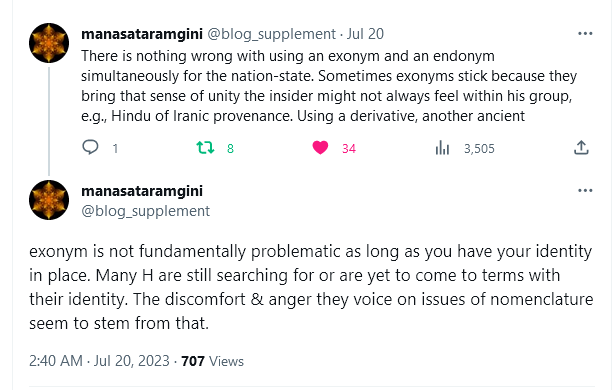Week 189: Endonym v Exonym, Development in Muslim Spain, Aesthetic!
07/30/2023 - Modern Hindu Content
Welcome to Eternal Path! This week we feature: a discussion on Endonyms vs Exonyms, Development in Muslim Spain, and an Aesthetic!
Religion Highlight: Endonym vs Exonym for Hinduism
In Week 187, we delved into why the use of the word “religion” to describe Hinduism is something that is useful for Hindus to claim in global discourse. The TLDR is that the term “religion” implies a level of sophistication and cohesiveness that us, as inheritors of a timeless and intricate tradition, clearly deserve to claim.
On a similar vein is the idea of “Hinduism” vs Sanatana Dharma. The latter is clearly the superior term and the endonym (name used by a group to refer to themselves) for Hinduism. “Hinduism” the term is an exonym (name used by an external group to refer to a group of people) and is an English portmanteau of “Hindu” (a term used by the ancient ancestors of the Persians to refer to Indians), and "the suffix “-ism” implying a belief system.
However, yet again, no matter how many WhatsApps get sent around, Hindus are not changing the English language. All the energy spent on “wE DoNt CaLl iT HinDuIsm, We cAlL iT SaNaTanA dHarmA” messages, could be much better spent on things like ensuring your kids know what the four yogas are, or on efforts to mainstream Hinduphobia. In the English language when people think Hinduism, they immediately are referring to the religion of the Vedas, with Sanskrit as a liturgical language, and with beliefs in reincarnation and liberation. “Hindu”and “Hinduism” are not dirty words, just use the exonym and move on.
History Highlight: Development in Muslim Spain
As many of our readers might be aware, Muslims ruled over large swathes of Spain from around 711 CE - 1492 CE. They were ultimately kicked out by the Christian Spanish reconquista, which then led to the Spanish (and Portuguese inquisitions), which came to India in Goa, where the Portuguese brutally killed, tortured, and converted Hindus.
Why is a Hindu newsletter talking about Muslim Spain? Because arguments about how Muslim rule “enriched” the local population in Spain are similar to those are bandied about to justify gruesome Islamic rulers in India, with one prominent claim being the “Mughals made India rich!”. Refuting these claims is important mental ammunition for Hindus to have in historical discussions of religion.
Let’s go into the impacts of Islamic rule on Spain. A new paper, published in the Journal of Economic Growth, and brought to our attention via the economics blog Marginal Revolution, outlines the negative impact of Islamic rule in Spain (link here), bolded parts for emphasis:
We use a unique dataset on Muslim domination between 711-1492 and literacy in 1860 for about 7500 municipalities to study the long-run impact of Islam on human-capital in historical Spain. Reduced-form estimates show a large and robust negative relationship between length of Muslim rule and literacy. We argue that, contrary to local arrangements set up by Christians, Islamic institutions discouraged the rise of the merchant class, blocking local forms of self-government and thereby persistently hindering demand for education. Indeed, results show that a longer Muslim domination in Spain is negatively related to the share of merchants, whereas neither later episodes of trade nor differences in jurisdictions and different stages of the Reconquista affect our main results. Consistent with our interpretation, panel estimates show that cities under Muslim rule missed-out on the critical juncture to establish self-government institutions.

